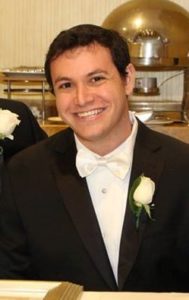 Jonathan (Yoni) Herskovitz is an MD/PhD student working with Dr. Howard Gendelman studying therapies for HIV. We were excited to talk to him about his work and his plans for the future!
Jonathan (Yoni) Herskovitz is an MD/PhD student working with Dr. Howard Gendelman studying therapies for HIV. We were excited to talk to him about his work and his plans for the future!
Tell us a little about yourself and your career goals.
I am California native, and though pursuing a career as a physician-scientist occupies the majority of my time, I still enjoy astronomy and home renovating. After graduating with a BS from UCLA (Go Bruins!), I worked in research at a pharmaceutical company outside Los Angeles for two years. This fostered my love for translational research that I hope to integrate throughout my career. Since I still have my clinical rotations remaining, it’s hard to say what specific field of medicine appeals to me the most, but I am certainly considering fellowship in infectious disease.
Could you tell us a little about your thesis?
My research focuses on optimizing gene therapy for human immunodeficiency virus (HIV). An estimated 36.9 million individuals are infected with HIV worldwide, and unfortunately, require lifelong treatment with antiretroviral drugs. We are developing a targeted delivery scheme for CRISPR-Cas9 (pioneered by our collaborators), that could specifically excise viral DNA from human immune cells. Most importantly, this strategy bears the potential to free patients from chronic reliance on anti-HIV medications.
How do you think your current work will inform your practice of medicine in the future?
 Laboratory research has instilled within me a number of disciplines that I hope to carry with me to clinical practice. I have learned how to formulate and test scientific hypotheses, just as I plan to create differential diagnoses and utilize labs to evaluate possible etiologies for illness. Although HIV infects individual cells, it has the potential to cause damage in almost every major organ system. This notion has taught me that it is important to remember that as clinicians, we treat people, not strictly diseases. Additionally, HIV impacts certain patient populations (e.g. communities in Africa, MSM, and IV drug users) with higher frequencies. It is therefore imperative to seek out opportunities to volunteer in at-risk and medically underserved areas so that I can best understand potential treatment complexities in my regular practice. Finally, my project has taught me to always think about how a particular product or finding can be improved upon. Frequently the answer to these questions requires help from others and it is this dynamic teamwork for the betterment of patients that excites me most about becoming a doctor.
Laboratory research has instilled within me a number of disciplines that I hope to carry with me to clinical practice. I have learned how to formulate and test scientific hypotheses, just as I plan to create differential diagnoses and utilize labs to evaluate possible etiologies for illness. Although HIV infects individual cells, it has the potential to cause damage in almost every major organ system. This notion has taught me that it is important to remember that as clinicians, we treat people, not strictly diseases. Additionally, HIV impacts certain patient populations (e.g. communities in Africa, MSM, and IV drug users) with higher frequencies. It is therefore imperative to seek out opportunities to volunteer in at-risk and medically underserved areas so that I can best understand potential treatment complexities in my regular practice. Finally, my project has taught me to always think about how a particular product or finding can be improved upon. Frequently the answer to these questions requires help from others and it is this dynamic teamwork for the betterment of patients that excites me most about becoming a doctor.
Tell us something about yourself unrelated to medicine and your research.
 I am an avid amateur stargazer / space enthusiast. Looking at our universe through my telescope and learning about various technologies to explore it inspires me too look past my immediate concerns towards something greater. Plus, my wife usually joins me for these astronomy outings, which is always a bonus.
I am an avid amateur stargazer / space enthusiast. Looking at our universe through my telescope and learning about various technologies to explore it inspires me too look past my immediate concerns towards something greater. Plus, my wife usually joins me for these astronomy outings, which is always a bonus.
We’re proud to have people like Yoni at UNMC who are furthering our understanding of complicated diseases and helping us provide the best care. If you’re interested in learning more about his work, check out his publications below:
Kinderman F, Yerby B, Jawa V, Joubert MK, Joh NH, Malella J, Herskovitz J, Xie , Ferba J, McBride H. Impact of Precipitation of Antibody Therapeutics following Subcutaneous Injection on Pharmacokinetics and Immunogenicity. J Pharm Sci. doi: 10.1016/j.xphs.2019.01.015 (2019).
Herskovitz J, & Gendelman, HE. HIV and the macrophage: from cell reservoirs to drug delivery to viral eradication. J Neuroimmune Pharmacology. doi: 10.1007/s11481-018-9785-6 (2018).
Herskovitz J, Ryman J, Thway T, Lee S, Zhou L, Chirmule N, Meibohm B, & Jawa V. Immune Suppression During Preclinical Drug Development Mitigates Immunogenicity-Mediated Impact on Therapeutic Exposure. J AAPS 19, 447-455, doi:10.1208/s12248-016-0026-8 (2017).
Joubert MK, Deshpande M, Yang J, Reynolds H, Bryson C, Fogg M, Baker MP, Herskovitz J, Goletz TJ, Zhou L, Moxness M, Flynn GC, Narhi LO, & Jawa V. Use of In Vitro Assays to Assess Immunogenicity Risk of Antibody-Based Biotherapeutics. PLoS One 11, e0159328, doi:10.1371/journal.pone.0159328 (2016).
Pandey P, Sliker B, Peters HL, Tuli A, Herskovitz J, Smits K, Purohit A, Singh RK, Dong J, Batra SK, Coulter DW, & Solheim, J. C. Amyloid precursor protein and amyloid precursor-like protein 2 in cancer. Oncotarget 7, 19430-19444, doi:10.18632/oncotarget.7103 (2016).
Cunningham CR, Champhekar A, Tullius MV, Dillon BJ, Zhen A, de la Fuente JR, Herskovitz J, Elsaesser H, Snell LM, Wilson EB, de la Torre JC, Kitchen SG, Horwitz MA, Bensinger SJ, Smale ST, & Brooks DG. Type I and Type II Interferon Coordinately Regulate Suppressive Dendritic Cell Fate and Function during Viral Persistence. PLoS Pathog 12, e1005356, doi:10.1371/journal.ppat.1005356 (2016).
Wilson EB1, Yamada DH, Elsaesser H, Herskovitz J, Deng J, Cheng G, Aronow BJ, Karp CL, Brooks DG. Blockade of chronic type I interferon signaling to control persistent LCMV infection. Science. 340(6129):202-7. doi: 10.1126/science.1235208.
Keep up the great work, Yoni! I have always been impressed by your ability to communicate your science with passion and ease.